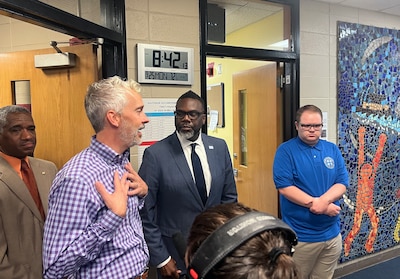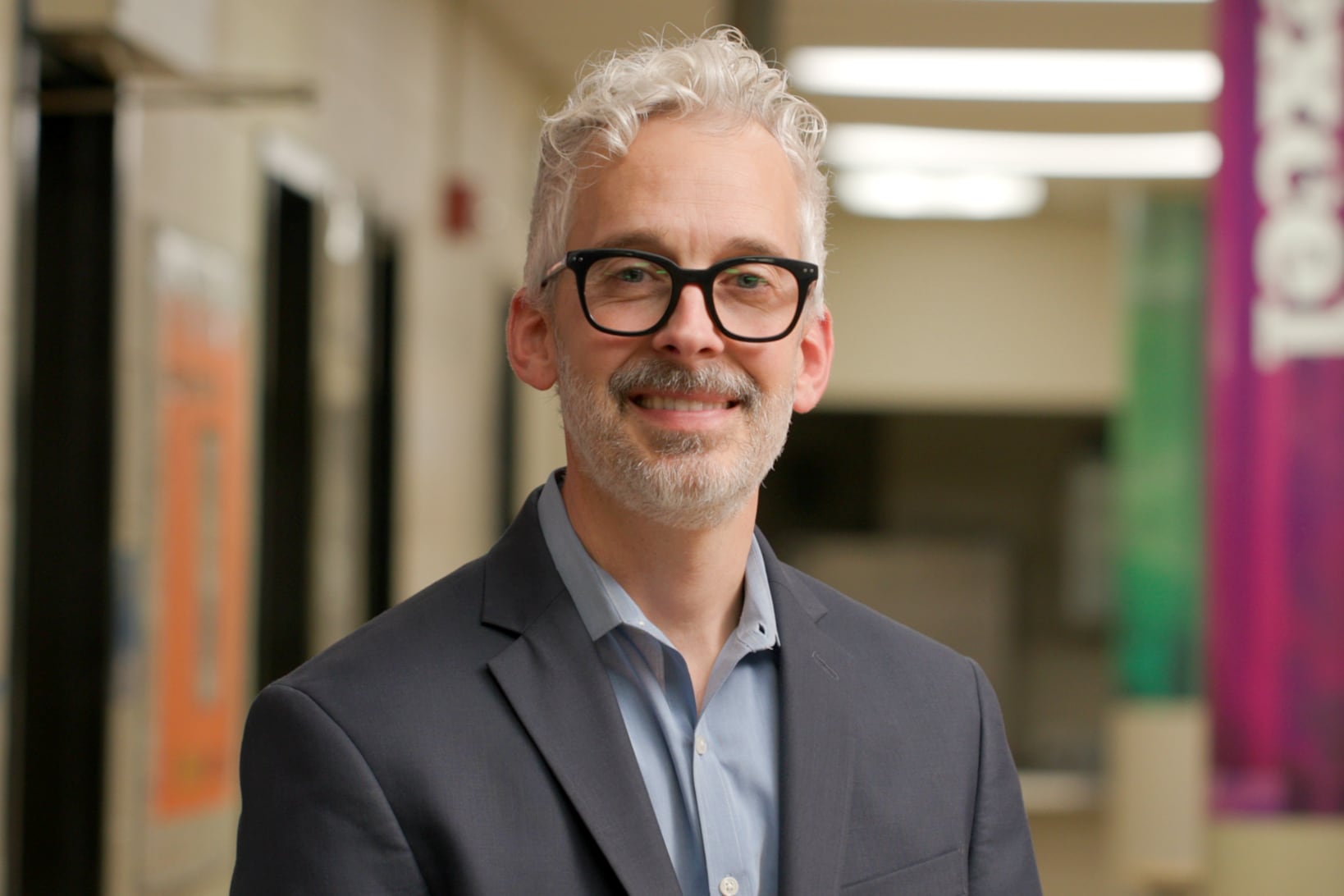Joshua Long, currently the principal of Southside Occupational Academy High School, has been selected to lead Chicago Public Schools’ beleaguered special education department, according to district officials.
The department — known as the Office of Diverse Learners Supports and Services — serves nearly 52,000 students with disabilities and has been without a chief since June. That’s when Stephanie Jones stepped down amid fallout from Chicago’s violations related to the use of restraint and timeout of students. The department has also struggled in recent years to ensure students with disabilities are getting services they’re legally entitled to under federal law.
Long sent a letter to families whose children attend Southside this morning announcing “with mixed emotions” that he accepted the role and would start after winter break, pending confirmation by the school board this Thursday.
“I am excited to continue working for students with disabilities and look forward to new opportunities to engage with all stakeholders as we move to positively impact each student’s experience in every school,” he wrote.
Ben Felton, chief talent officer at Chicago Public Schools, said the district used an external search firm and input from city officials, local advocates, educators, and other staff in its search for a new department head.
“We approached this differently than we had in the past given how critical this role is to CPS and how deeply invested many of our stakeholders are in special education and in this position,” said Felton.
Representatives from Access Living, the city’s Office of People with Disabilities, district principals, the Dyslexia Collaborative, and the Chicago Teachers Union were among the community groups that had a conversation with finalists and provided feedback, Felton said.
CEO Pedro Martinez made the final recommendation; the school board, which meets on Thursday, must approve the appointment.
Long would be inheriting a department beset with problems. The district is under state watch on multiple issues, including providing timely transportation to students with disabilities and for how it physically restrains students in the classroom.
Long has been the principal of Southside since 2010, according to his LinkedIn profile. In 2019, he won the prestigious statewide Golden Apple Award for Excellence in Leadership.

Before that, Long worked in various positions, including as a speech pathologist in a dozen schools, he told Chalkbeat in 2019. At the time, when Chalkbeat asked Long how the district should help students with disabilities, Long said he saw classes that “were not being run effectively” and weren’t “as rigorous” as other schools he’d been in. With that in mind, Long said “that the biggest thing is establishing equity for all students no matter which school or neighborhood they are in.”
Some district leaders have known Long for years. Board of Education member Mary Fahey Hughes, a longtime advocate for students with disabilities, sent her son to Southside. During a school visit with Mayor Brandon Johnson in September, Hughes praised the school and its model, which is designed to help those with more challenging disabilities transition into the real world.
“The thing I love about this place is there is so much respect for students where they’re at,” she told Chalkbeat at the time.
Long was a proponent of changing the timeline for when students with disabilities could transition out of public schools. Previously, under state law, some students with disabilities could receive services until the day before their 22nd birthday. In 2021, state law changed to allow students who turn 22 during the school year to remain eligible for services through the end of that year.
Long has also advocated for improving funding and availability of services for students with intellectual and developmental disabilities once they graduate from CPS. In an interview with Chalkbeat during the September school visit with Johnson, Long said the state has a yearslong waiting list for people with more challenging disabilities who want to access state-funded adult services, such as for community-based living or day services, that are meant to provide people with more independence. One of his former students accessed such services eight years after she graduated from Southside, he said.
“Our students do best through routine and through daily interactions,” Long said. “Now, she sat home for eight years and likely lost a lot of skills that she learned here with us.”
Long’s appointment comes after the district leaders signaled this fall that they were interested in expanding the school model Long oversaw. Southside is one of a handful of so-called specialty schools that focus on teaching students with intellectual and developmental disabilities about work and life skills. Southside, for example, has classes that teach students how to work in retail, food service, and auto mechanics. Unlike most schools, the district assigns students to these schools.
The district is under state watch regarding multiple issues for how it supports students with disabilities. Last year, the state launched a corrective action plan requiring the district to cap bus commute times for students with disabilities to 60 minutes each way. About 3,000 students with disabilities exceeded that limit at the start of last school year, according to the district.
Under state watch, those travel times have vastly improved this year, after the district decided to stop busing general education students, largely those in magnet and selective enrollment programs. In September, the state launched a new corrective action plan to ensure the district is providing transportation to all students of disabilities whose Individualized Education Programs, or IEPs, call for bus service.
This spring, documents obtained by Chalkbeat revealed the district had been under state watch for failing to follow state law on physical restraint and timeout for students. The state board said that Chicago was not notifying parents of incidents, staff and faculty were not trained in how to properly restrain and seclude students, and untrained staff were using outlawed methods of restraint.
The state board named Jones for failing in her role as a designated official to look into restraint and timeout incidents. In that role, she was required to maintain copies of incidents, be notified of incidents that occurred during the school day, and receive documents of physical restraint and timeout incidents that went on for a long time.
Prior to Jones’s time as chair, the district’s department responsible for supporting students with disabilities had been in trouble with the state before. A 2017 investigation WBEZ found Chicago Public Schools secretly overhauled the special education department in 2016, resulting in students losing access to vital services. The State Board of Education placed the district under a corrective action plan in 2018, which lasted until 2022. During the 2022-23 school year, the state placed Chicago under a general supervision plan to continue to watch how the district handles special education services.
Now, Long could play a key role in ensuring that the department is delivering services to students with disabilities, monitoring physical restraint and timeout incidents, and helping students catch up after the coronavirus pandemic disrupted education.
Samantha Smylie is the state education reporter for Chalkbeat Chicago covering school districts across the state, legislation, special education and the state board of education. Contact Samantha at ssmylie@chalkbeat.org.
Reema Amin is a reporter covering Chicago Public Schools. Contact Reema at ramin@chalkbeat.org.
Becky Vevea is the bureau chief for Chalkbeat Chicago. Contact Becky at bvevea@chalkbeat.org.






